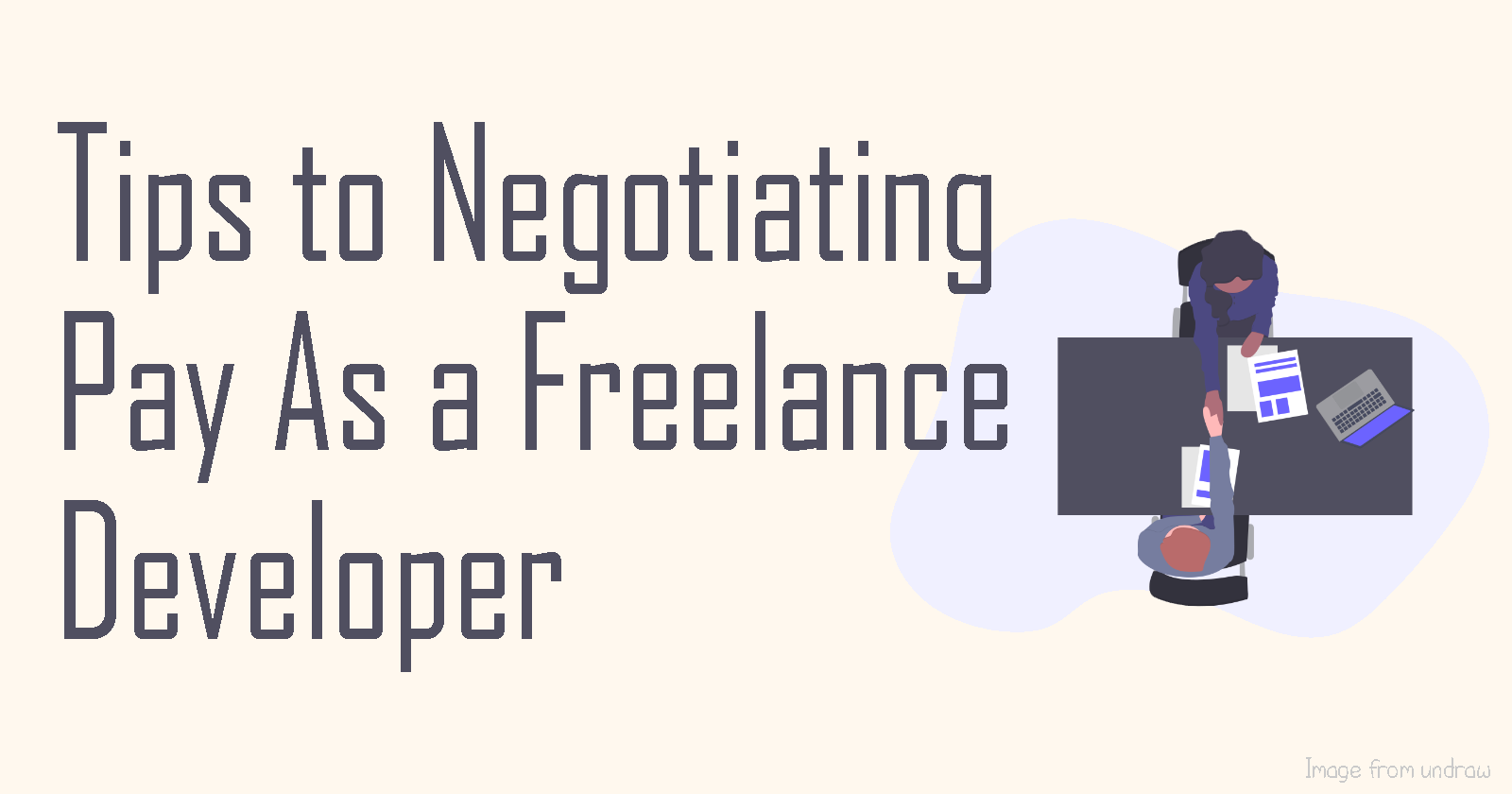Tips to Negotiating Pay as a Freelance Developer

In the world of freelancing, pricing your services is probably one of the most debatable areas you will have to face. Ensuring that your proposed price is equivalent to your client's perceived value of you is necessary in order to reach an agreement.
Hello everyone! As seen from the title, this article will cover a topic that I've never written on my blog before - freelancing. I decided to write on this topic due to requests by some of my readers.
My Experience with Freelancing
I have been full-time freelancing as a web developer and technical writer since May 2020. With that said, all the tips I am about to give in this article merely comes from personal experience since I am no expert.
In a span of 6 months, I have negotiated countless rates and have succeeded thanks to these tips I am about to share with you. So, let's get on with those tips!
1. Talk about the value not the price
When negotiating your price, it seems obvious to start getting into numbers and debating whether your services deserve $100/hour or $200/hour or etc.
This, however, is the least effective way to negotiate. After all, when you are freelancing, numbers are all subjective. It doesn't mean anything unless you put some value into it.

What I found most efficient in negotiation is to start with pitching your value. Try to answer the following questions:
- Why should
client_namehire you? - How are you different from other developers offering the same services?
- What can you bring to the table that will help
client_namegrow their business?
If you understand your worth and value you can bring to your client, it will be easier for you to negotiate a higher rate, because you believe that you deserve it. Your perceived value will naturally be reflected in your confidence and the way you communicate to your client. The client will sense this and will be more willing to offer a higher price.
2. Numbers as previous evidences
After determining your value and communicating that to the client, the next step is to use numbers to further persuade the client that your value is worth $x/hour or $x/word.
These numbers include:
- The rate on your previous clients
- Number of projects you have done in the past
Having a solid number allows the client to properly gauge your value. For example, the rate you charged previously was $150/hour and you have completed 3 projects so far. This will tell the client your level of experience, and then they will likely be more willing to match your previous price or offer your proposed higher price based on their perceived value of you.
3. Leverage benchmarks/other offers
Including the market rate of similar freelancers also helps because it lets the client have a benchmark reference and get a rough idea of the pricing in the industry. It is especially useful if the client has not engaged in freelancing services before.
If you are swamped with other offers, I think it is fair to be transparent and let them know that you are charging $x/hour for another client. That way, the client will more likely accept your price since another client has accepted it too.
4. Use the "We" language
It is important to communicate to your client that you both are on the same side. Instead of saying,
"I need $x/hour because for me..."
I often say,
"If it's okay, we can agree on $x/hour. If not, we can work something out."
That way, the client will not feel that he/she has to sacrifice or compromise to get your services. It is more about working together to reach an agreement that both parties will be happy with. A win-win and not a win-lose situation.

5. Be polite but assertive
Freelancers are often underpaid because they are afraid they may lose a precious client if they price too high. But my rule is, if you think the price is reasonable and reflects your value appropriately, then don't be afraid to be assertive.
Of course, remember to always be polite because no client wants a freelancer that seems too stubborn and insisting. Simply state the aforementioned points 1 to 4 of this article. Emphasizing on your value and experience, utilizing benchmarks and the "We" language to increase the client's perceived value of you.
This won't usually happen but if the client still insist on their lower price, then it will be up to you. Compromise and accept the offer, or reject and find another client. Ultimately, negotiation is all about your perceived value of each other.

Thanks for reading!
From my experience, most clients I have negotiated with gave positive responses and were highly satisfied with the value I bring. Although negotiating seemed scary to me at first, I realized that at the end of the day, it's about understanding each other and communication.
I hope this has been a helpful read. If you have other negotiation tips, please share in the comments below. Don't forget to give a like or share if this is helpful. Thanks and cheers!
P.S. : I'm starting a new job next week and will no longer be freelancing as often but it has been a wonderful experience and I have definitely grown a lot as a developer and communicator since I started :) All the best to freelancers out there!



